人教版新课标必修四第二单Language points(考点) in reading II
- 格式:doc
- 大小:59.50 KB
- 文档页数:2
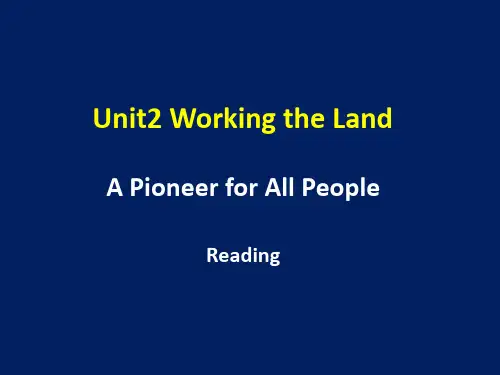
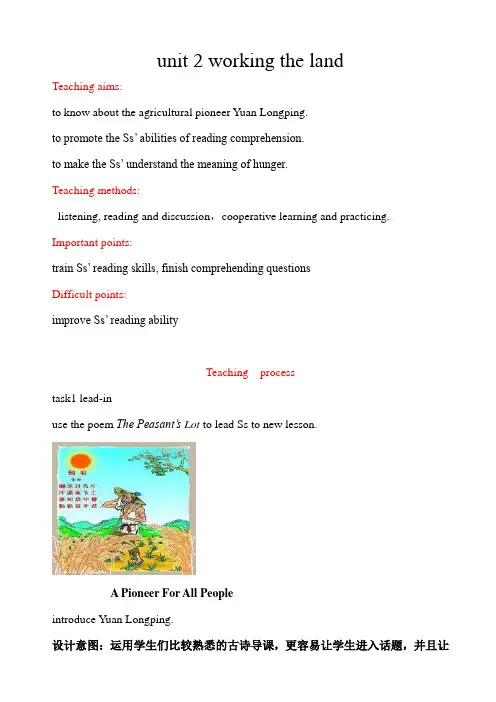
Ⅰ.重要单词聚焦. .消费;消耗;耗尽;吃完. . 胡乱的;任意的. . 现象. . 燃料. . 量;数量. . 趋向;易于;照顾. 照顾;护理. . 资料;数据. . 趋势;倾向;走向. . 大灾难;浩劫. . 反对;反抗;与(某人)较量. . 反对的;独立的. . 温和的;温柔的;淡的. . 结果;后果;影响. . 陈述;说明. . 种类;范围. . 看一下;扫视. 一瞥. . 平稳的;持续的;稳固的.. 平均的. . 生存;存在. . 拥护;提倡;主张. . 随便的;漫不经心的;偶然的. . 环境;情况. . 贡献. . 分歧;不一致Ⅱ.重点短语扫描.发生;造成.同意,赞成,订阅.上升;增长;升起.反对…….继续.大体上;基本上.平均来看低于高于平均水平.忍受;容忍.等等.大量的.导致.甚至.代表……一方;作为……的代言人.只要Ⅲ.课文原句突破. .[信息提取]’ ...意为“……是毫无疑问的”。
[例句仿写] 毫无疑问,北京奥运会是一个巨大成功。
.【答案】., .[信息提取] 即使;尽管,引导让步状语从句,与近义。
[例句仿写] 即使受到邀请我也不去参加他的晚会。
, .【答案】.—,![信息提取] =“只要”引导条件状语从句。
[例句仿写] 只要你有自信,你会获胜的。
,’ .【答案】.,,, .[信息提取] 句中作为“需要”讲,常用于 ...结构。
[例句仿写] 要想成为一名长跑运动员,需要有体力和耐力。
- .【答案】.量;数量() (=) 大量地’ .如果你大量购买要便宜得多。
.我弟弟买了大量的书。
.这个地区的雨量很大。
.大量的食品和帐篷被从山东运到汶川。
后同样可接不可数名词或可数名词的复数形式。
但当它作主语时谓语动词一般根据其所修饰的名词而定,而作主语时,不论其后的名词可数或不可数,谓语动词都用复数。
.(年福建卷)—?— .....【解析】句意为:——这湖水怎么这么难闻?——因为大量的水已经被污染了。
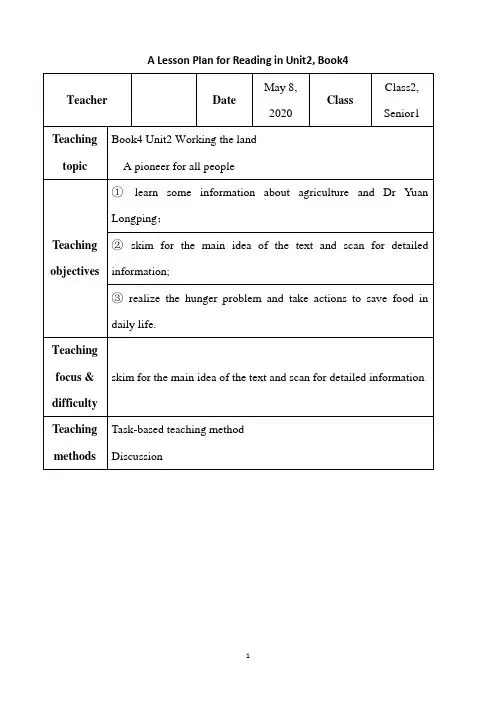
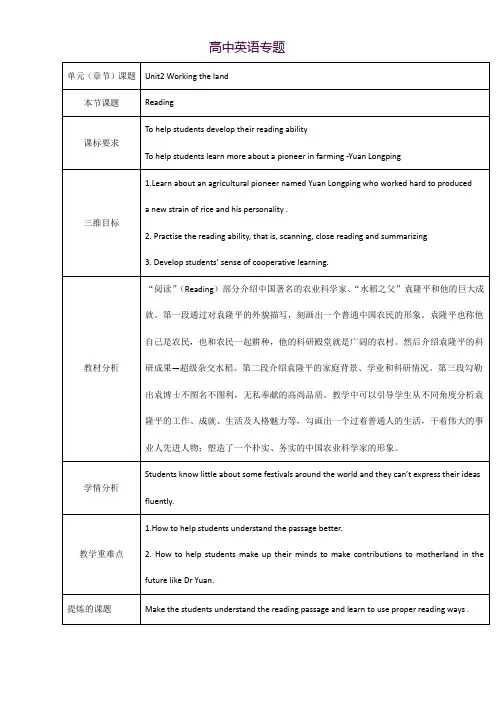
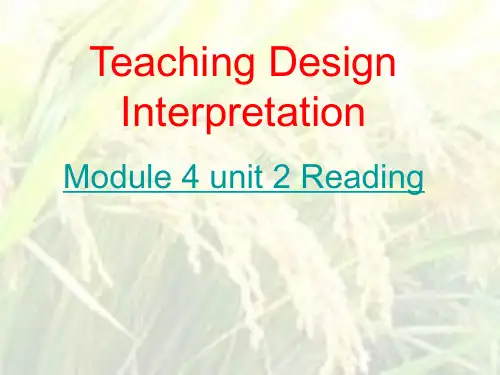




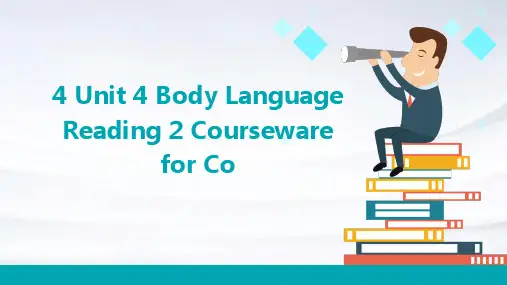
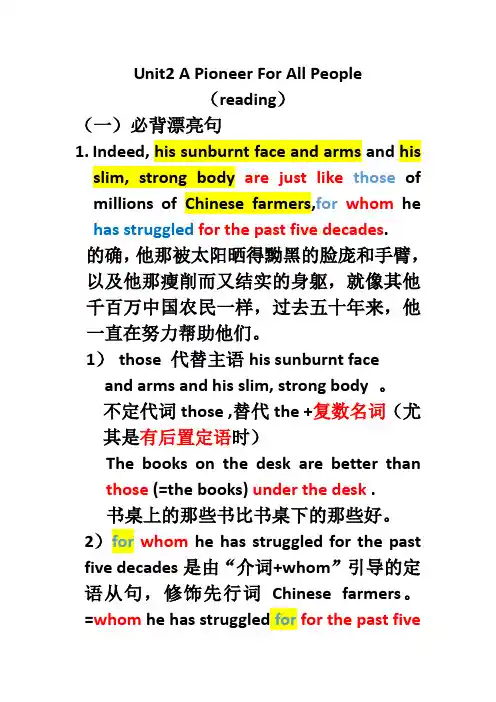
Unit2 A Pioneer For All People(reading)(一)必背漂亮句1.Indeed, his sunburnt face and arms and his slim, strong body are just like those of millions of Chinese farmers,for whom he has struggled for the past five decades.的确,他那被太阳晒得黝黑的脸庞和手臂,以及他那瘦削而又结实的身躯,就像其他千百万中国农民一样,过去五十年来,他一直在努力帮助他们。
1)those 代替主语his sunburnt faceand arms and his slim, strong body 。
不定代词those ,替代the +复数名词(尤其是有后置定语时)The books on the desk are better thanthose (=the books) under the desk .书桌上的那些书比书桌下的那些好。
2)for whom he has struggled for the past five decades是由“介词+whom”引导的定语从句,修饰先行词Chinese farmers。
=whom he has struggled for for the past fivedecades.eg I won’t forget Miss Yang with whom Iworked for three years=I won’t forget Miss Yang whom I worked with for three years2.Yuan Longping grows what is called supperhybrid rice.袁隆平种植的是被成为“超级杂交水稻”的种子。
what is called supper hybrid rice是由what 引导的做grow的宾语从句。
Unit2 Reading for using 教学设计第二课时(Reading for using)词汇和句型1. Teaching Analysis 教情分析1.1 Teaching objectives-教学目标1.1.1 Language target语言目标1.1.1.1 Key words & expressions重点词汇和短语1.1.1.1.1For applying: struggle, expand, circulate, battle, rid, freedom, therefore, equip, thanks to, rid…of, be satisfied with, would rather1.1.1.1.2 For comprehending: grain, hunger, disturbing, confuse, bacteria, pest, soil, nutrition, mineral, root, skim, underline summary,1.1.1.1.3 For recognizing: hybrid, strain, Vietnam, sorghum, peanut,1.1.1.2 Sentence structures 重点句型①Since then, finding ways to grow more rice has been his life goal. P10②Dr Yuan searched for a way to increase rice harvest without expanding the areaof the field. P10③Thanks to his research, the UN has more tools in the battle to rid the world ofhunger. P10④Using his hybrid rice, farmers are producing harvest twice as large as before.P10⑤…however, he doesn't care about being rich. P10⑥He would much rather keep time for his hobbies. P10⑦He enjoys listening to violin music, play mah-Jong, swimming and reading. P10⑧Spending money on himself or leading a comfortable life also means little tohim. P10⑨Just dreaming for things, however, costs nothing. P10⑩Dr Yuan woke from his dream with the hope of producing a kind of rice that could feed more people. P101.1.2 Ability goals能力目标1.1.2.1 Help Ss learn how to use these words and expressions freely to express theirideas and use the -ing form as subject and object as they like. They can also practise actively and attentively so that they reach their goals.1.1.2.2 Enable Ss to use the important sentence structure either in orally or in writing.1.2 Teaching important points 教学重点The usage of the important words and the -ing form used as subject and object. 1.3 Teaching difficult points 教学难点How to use the words and expressions and the -ing form freely.1.4 Teaching methods 教学方法Explaining, discussing and practising.1.5 Teaching aids 教具准备Blackboard, chalk, a computer. projector2. Student analysis学情分析2.1 Fundamental state基本情况经过上一课时的学习,学生对本单元的主要内容——Agriculture and farming 以及Dr Yuan有了一些了解,对文章的主要内容和文章结构有了清楚的了解,这利于学生在上下文语境中去进一步学习词汇和掌握重点句型结构并且在此基础之上能进行一些翻译练习和词汇的拓展练习。
Language points(考点) in reading II in using language in unit 2 in book 4
1.over/in the past half century 在过去的半个世纪里
2. cause damage to 对…造成伤害
3. even more dangerous 甚至更危险的是…
4. wash off 冲洗掉
5.These chemicals in the food supply build up in people’s bodies over time.
supply.
1).用作名词时:
a) 指“供给;供应”等
supply and demand 供与求 be in short supply 供应缺乏,供应不足 food supply 食物供应 water supply 供水
When I meet difficulty, my roommates will_____me help.
The government need to _______ food and clothes for these old people
All the rooms are ___ with electric lights.
A. supplied B. given C. offered D. burnt
6. build up 逐渐积聚; 增进,增强
来往的车辆在通往市区的路上越聚越多。___________________________________________.
build up one’s health/body ________________________________.
7. lead to (lead—led—led ) 通向;导致(某种)结果;造成
This road ___________________(通向) the railway station.
条条大路通罗马___________________________________________.
他的错误导致失败。_____________________________________________.
8.in addition (to) 除…之外;此外;并且
We met some friends and other people __________.
____________ the killed and wounded,many were missing.
_________, I want to tell you something about Tom.
in addition 常放在句首,用逗号隔开,或放在句末;in addition to后面常跟名词或名词短语
9.They focus on keeping their soil rich and free of disease.
focus on : 集中(注意力、精力)于
把注意力集中在你工作上.______________________________________________.
所有眼睛都注视着他。_____________________________________________________.
10.keep…free of /from: protect.. from 使免受(影响,伤害等)
健康饮食和锻炼使你远离感冒。________________________________________________.
11. reduce_____ 减少/降低了 reduce ______ 减少/降低到
12. every few years _______________________________.
13. put sth back into _______________________________.
14. use different levels of soil____________________________
15.(be) followed by 后面是,后面有,接着是
天气预报之后是广告时间___________________________________________________..
16.put down deep roots__________________________
17.猫和狗之中我更喜欢狗。__________________________________________.
________________________________________. ______________________________
我喜欢步行更甚于骑自行车。___________________________________
_______________________________ ________________________________.
18.carry away___________________
19. avoid (doing) sth 避免做…
她试图避而不答我的问题。_______________________________________________.
Homework:
Revise the content of this passage.